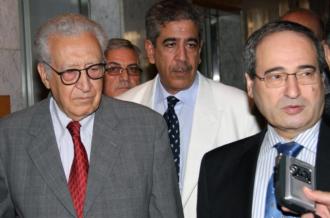DUBAI, United Arab Emirates (AP) -- In back-to-back Asian summits this month, Iran's president made sure to carve out special time to look east.
At one gathering in Azerbaijan, Mahmoud Ahmadinejad reminded the president of Kazakhstan about the vision of a railway linking the heart of Central Asia with Iran's warm ports. At another meeting in Kuwait, he held talks with Tajikistan's leader about their growing trade ties.
Even as U.S. and European sanctions tighten around Iran's economy, officials in Tehran are busy reaching out to Asian markets as a critical lifeline. For months, Iran's oil sales to energy-hungry nations such as China and India have been the focus of intense Western efforts to reduce the flow as part of pressure over Iran's disputed nuclear program.
Yet lesser - but not insignificant - economic pathways for Iran also run along the ancient Silk Road connecting China and the Middle East. While Iranian trade and projects in Central Asia are tiny compared with oil sales to the continent's economic powerhouses, the outreach represents another way for Tehran to seek economic buffers from sanctions in a region where Washington holds relatively limited sway.
It also displays some of Iran's first steps at trying to diversify its economy away from oil - which still represents 80 percent of foreign currency revenue - and develop backyard markets for its construction and technology industries.
"The Iranian economy is so strong that it could live without oil revenues," said Iranian President Mahmoud Ahmadinejad at a pan-Asian summit last week in Kuwait. "Our people could get accustomed to that and I think that things will change in the near future."
On Tuesday, Iranian Oil Minister Rostam Qasemi told an energy conference in Dubai that Iran has contingency plans to run the country without the critical oil revenue, including investments in solar and other renewable sources.
While Iran is a long way off from functioning without its oil income - and may never reach that stage - the remarks reflect real ambitions to turn Central Asia into a key market for Iranian goods and technological expertise while offering the landlocked former Soviet republics access to the sea.
In August, carmaker Iran Khodro announced plans to boost exports to Kazakhstan and Turkmenistan. In Tajikistan, Iranian construction firms are major builders with projects such as hydroelectric power stations and a $39 million tunnel that connects the capital Dushanbe to northern Tajikistan.
But the centerpiece of the Islamic Republic's outreach - an uninterrupted rail link through Central Asia - remains caught up in disputes and competing ventures more than 15 years after the first leg was opened between Iran and neighboring Turkmenistan.
Last month, Turkmenistan's president, Gurbanguli Berdymukhamedov, abruptly canceled a reported $700 million contract with Iran's Pars Energy to continue the rail line to Kazakhstan along the Caspian Sea coast. The reasons were unclear, but Turkmenistan has been reviewing its deep trade ties with Iran as Western sanctions widen.
Meanwhile, Turkmenistan and Uzbekistan have expressed interest in joining a rail project running from Azerbaijan's Caspian Coast to the eastern Turkish area of Kars. Such a railway would bypass Iran and still provide the sea access coveted by the Central Asian states.
"Iran has no choice but to turn to Asia for trade" because of the Western sanctions, said Sasan Fayazmanesh, an economic affairs expert and head of the Middle East Studies Program at California State University, Fresno. "But that, of course, will not solve Iran's problem of selling its oil since the Central Asian countries, for the most part, do not need Iran's oil."
But for Tehran, its overtures to Central Asia mean more than just a price tag.
Iran has been a cultural point of reference for centuries across the ex-Soviet states through books, films and traditions dating back to Persia's pre-Islamic Zoroastrian faith. Iran's main Central Asian foothold, Tajikistan, also shares linguistic ties that give Iran an important commercial edge over China and Russia.
A weak link for Iran, however, is the rifts within Islam. Much of Central Asia is Sunni Muslim and governments are cautious about any moves that could stir sectarian tensions with Shiite minorities. These same divides, in turn, help cement the influence of Shiite Iran in Iraq and parts of Afghanistan.
"Iran's future in Central Asia and most of Afghanistan is constrained by the fact that its government is officially Shiite and nearly all the populations of these countries are Sunni," said Frederick Starr, chairman of our Central Asia-Caucasus Institute at Johns Hopkins University.
"Both sides worked out a practical understanding of this issue shortly after the collapse of the USSR, which effectively keeps Iran from advancing its religious cause in the region," he added.
At the same time, Iran is increasingly fearful that Washington could seek to build stronger ties in Central Asia following the planned withdrawal of NATO troops from Afghanistan by the end of 2014.
Central Asia has been a stop for top U.S. envoys in the past year. Secretary of State Hillary Clinton visited Uzbekistan a year ago and Secretary of Defense Leon Panetta traveled in March to Kyrgyzstan, where the U.S. already has an air base used for airborne refueling missions and as a transit point for troops in Afghanistan.
"Iran's ruling elites are practically unanimous in their belief that the announced departure (from Afghanistan) is nothing but a cover for a strategic regrouping," wrote Nikolay Kozhanov, a regional affairs analyst at the Institute of the Middle East in Moscow.
He also noted that the growing attention to the region has given Central Asian leaders more options.
"These countries have undergone drastic changes in self-perception over the past decade," he wrote in an August essay for the Washington Institute for Near East Policy. "No longer do they see themselves as living in a landlocked, isolated region whose relations with the external world depend completely on Russia or Iran."

